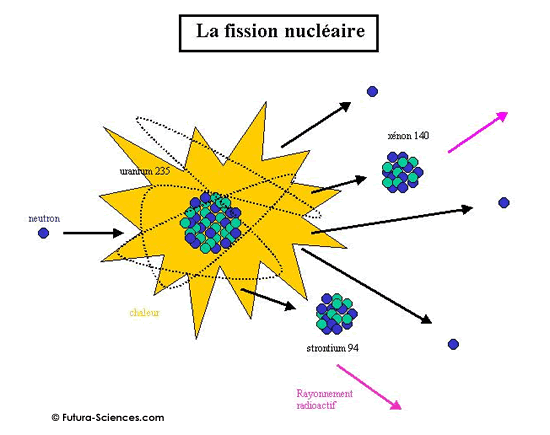-
 Jarosite
Jarosite
-
 Dendroenergy
Dendroenergy
-
 Guiana Space Centre
Guiana Space Centre
-
 Dysaesthesia
Dysaesthesia
-
 Methyl bromide
Methyl bromide
-
 Lagging
Lagging
-
 Liposome
Liposome
-
 Eisenmenger complex
Eisenmenger complex
-
 Oviparous
Oviparous
-
 Endosome
Endosome
-
 Humerus
Humerus
-
 Aspartic acid
Aspartic acid
-
 Useful substances
Useful substances
-
 Wood pellets
Wood pellets
-
 Naevus
Naevus
-
 Artichoke
Artichoke
-
 Black liquor
Black liquor
-
 SDH
SDH
-
 Jatropha
Jatropha
-
 Conjugation
Conjugation
-
 Electron transfer chain
Electron transfer chain
-
 Methylation
Methylation
-
 Telescope
Telescope
-
 Anti-oncogene
Anti-oncogene
-
 Technical assessment
Technical assessment
-
 Tau
Tau
-
 Constellation of Auriga
Constellation of Auriga
-
 Biosphere
Biosphere
-
 Rate determining step
Rate determining step
-
 Solar system
Solar system
Nuclear fission
Nuclear fission is the splitting of an unstable nucleus into two lighter nuclei and several elementary particles. This splitting is accompanied by a release of heat, i.e. of energy.

Spontaneous fission exists but it is very rare. The only naturally fissile element is uranium 235. Struck by a neutron, the nucleus becomes unstable and is transformed into two lighter nuclei, also unstable, called fission products. When the neutron collides with the nucleus, these fission products are ejected at high speed. The nuclei from this fission are radioactive in most cases, but they have quite a short half life.
Fission releases a huge amount of energy. 1 gram of uranium 235 releases as much energy as the combustion of several tonnes of coal. The neutrons released by fission have very high energy. If they can be slowed down enough, they can cause further fission and the reaction continues and accelerates. In nuclear reactors, the reaction is self-sustaining. But if the number of neutrons is allowed to rise, the reaction can become explosive, which is what happens in an atomic bomb (an A bomb).
Latest
Fill out my online form.



